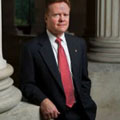
www.webb.senate.gov
In the early days of our republic, President Andrew Jackson established an important principle of American-style democracy – that we should measure the health of our society not at its apex, but at its base. That focus has been lost, as many on Wall Street have accumulated vast wealth while the middle class falls steadily behind. When regions of Virginia are experiencing more than 21 percent unemployment and so many working Americans continue to struggle in this economy, it is only just that our leaders protect the interests of America’s working people.
The reckless practices on Wall Street that led to the financial meltdown were unfair to the average worker and risked the United States’ economic position in the world. The regulatory structure in place failed to protect both our financial system and the U.S. taxpayer. We must act to prevent another financial crisis and future bailouts. Americans need a reformed financial system that puts their homes and retirements before Wall Street bonuses.
The Senate is now considering a financial reform bill, which could be an important step forward in reining in some of the worst abuses of recent years and bringing enhanced oversight and transparency to our financial system. However, it could be improved in a number of areas.
Executive compensation. I introduced my Taxpayer Fairness Act as an amendment to the bill. My amendment would give American taxpayers an upside in the recovery of our economic system, which became possible only because their tax dollars saved it. It puts a one-time windfall tax on bonuses paid in 2010 to executives of the thirteen financial institutions that received $5 billion or more of taxpayer support under TARP or the Housing and Economic Recovery Act of 2008 (Fannie Mae and Freddie Mac). This one-time, 50 percent excise tax on bonuses above $400,000 would raise, at a minimum, an estimated $3.5 billion. Nothing is more fair or appropriate than to make American taxpayers whole after they infused our financial system with capital necessary for its recovery.
Too big to fail. I agree with the prevailing economic consensus that, in the words of former Fed Chairman Alan Greenspan, “If they’re too big to fail, they’re too big.” That is why I cosponsored an amendment offered by Senator Sherrod Brown to put reasonable limits on the size of financial institutions. I also cosponsored the successful amendment offered by Senator Merkley to prevent banks from engaging in some of the riskiest behavior—proprietary trading for their own benefit—to the detriment of their own clients and depositors.
Consumer protection. Abusive lending practices have proliferated in recent years, with little oversight or regulation. I am a cosponsor of two amendments that would crack down on outrageous credit card rates, by allowing states to regulate interest rates within their own borders—as they could prior to 1978—and by capping the maximum allowable rate at 15%. I also voted to preserve a strong, independent consumer protection agency that will have the ability to conduct meaningful oversight, while exempting smaller banks and other businesses from potentially onerous regulations.
Transparency. The American people deserve to know where their tax money goes. The TARP program was only the most visible of the taxpayer-financed bailouts of the financial industry; the Federal Reserve also provided hundreds of billions of dollars in other assistance as well. I am a cosponsor of an amendment that would require an audit of the Federal Reserve, in order to determine the extent of the taxpayer assistance that was provided to these private companies.
Protecting USAA. I cosponsored an amendment to ensure that the United Services Automobile Association (USAA) will continue to provide a full spectrum of financial services for the U.S. military community.
Further steps are required. I am committed to ensuring that Congress also addresses reform of Fannie Mae and Freddie Mac. Nearly 97% of new U.S. mortgages are financed through those two institutions, and we must be careful in the way we go about doing so. I look forward to a full debate and a comprehensive bill in the near future about their proper role in our economy.
Congress must restore to our financial system a regulatory structure that will prevent this regrettable chapter in American history from ever happening again. Starting from the basic principle of fairness for all Americans, I will continue to fight to improve the bill that is before us, and I look forward to its final passage into law.










